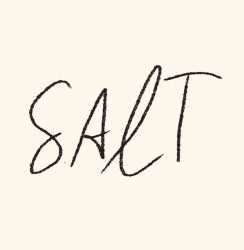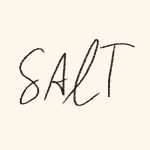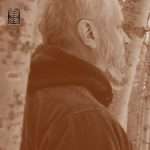MARIANNA MARUYAMA & HESSEL VELDMAN – SALT
Hessel Veldman has produced experimental music ever since the ’70s. He was (and still is) a passionate advocator of DIY music and cassette culture. In recent years, he turned his focus to creating new music, such as releases with Martijn Comes (such as Manifest Exodus), and his solo album Ymuiden.
For Salt – released on cassette (as expected) via Stroom – he provides subtle, almost unnoticeable (but atmosphere-defining) drones for the spoken word poetry of Marianna Maruyama.
Marianna has a beautiful soft voice, intimate – it feels as if you have already known her for years. She describes everyday incidents in a completely unique, personal way. About her dentist, for example, who ‘eased my pain and caused some, too’, and ‘no one wants to think about dentistry as being a practice of touch’.
While currently living in the Netherlands, she also recalls a long list of jobs she had when living in Tokyo – with some remarkable occupations among them: ‘lipstick tester, wine taster, page-turner, onsen companion’. One of these jobs was recording her voice for use in an automated cooler (‘Press 1 for cold water’). Remembering this job, she asks herself ‘I wonder where my voice has gone – and to whom it has spoken’.
As the album progresses, the atmosphere gets somewhat more tense. In the fourth track, Are You Satisfied?, Marianna‘s voice gets some alienating treatments, increasing the intensity. But with Not Knowing, the album closes quietly again. The music gets more uplifting than it was before, bringing this hallucinogenic album to a peaceful end.
‘When I let him read my poems he said they were more like thoughts. I think they can be both’
This album requires dedicated listening – this is not intended to be played in the background. Observations like Maruyama‘s, spoken like this and combined with Hessel Veldman‘s ethereal soundscapes are like dreaming with eyes wide open.
NATE WOOLEY – HENRY HOUSE
Nate Wooley is an American composer and trumpet player ‘dedicated to the American tradition of vibrantly shaggy experimentalism’. He has worked closely with many familiar artists, Eliane Radigue and Annea Lockwood among many other familiar names.
As I understand it (I’m not familiar with his work), Henry House is a rather radical departure from most of his work. Here, he is the composer who has ‘removed himself as a performer’.
The ‘recurring dream song’ on this album combines ‘closely tuned instruments and sinetones, tape-music editing techniques, field recordings, and voice’ in an eighty-minute, five-part song cycle.
The texts about the fictional main character were taken from four different sources (details can be found in the liner notes), but then extensively edited, processed, rewritten, and restructured to become the finalized texts heard in tracks one and two. For each next piece, they were rewritten again ‘to further the depth of the stories’.
In three of the tracks, the texts (spoken by Matt Maneri) are accompanied by ‘the interactions between slowly shifting sine tone frequencies and massed, slightly detuned instruments—vibraphones, brass, pianos—to affect a warmly wobbling harmonic pad’.
The other two tracks – both called Stump The World – are spoken by Megan Schubert in an alienating combination with field recordings, interspersed with ‘hard cuts of her singing voice constructed into a massive, tape-affected choir’.
Like all spoken word projects, these pieces require dedicated listening. At the same time, they have an elusive dreamy atmosphere. It may not be the easiest to listen to, but rewarding ‘vibrantly shaggy experimentalism’ it definitely is!
Henry House is released on the Ideologic Organ label, which is curated by Stephen O’Malley. It is available on CD and as a digital download.
NATE WOOLEY – HENRY HOUSE (short edit)
[this is only a short edit of two fragments from track 1 and 3]




